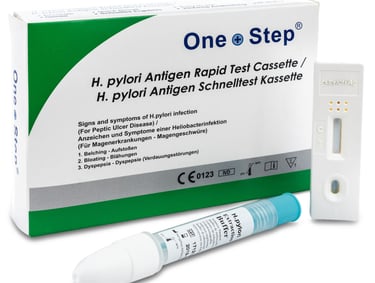How to detect a stomach ulcer
9/12/20232 min read
How to Detect a Stomach Ulcer
What is a stomach ulcer?
A stomach ulcer is a sore that develops in the lining of the stomach. It can also occur in the first part of the small intestine (duodenum). Stomach ulcers are most commonly caused by a bacteria called Helicobacter pylori (H. pylori). Other causes of stomach ulcers include the use of nonsteroidal anti-inflammatory drugs (NSAIDs), such as aspirin and ibuprofen, and long-term use of steroids.
The most common symptom of a stomach ulcer is a burning pain in the upper abdomen. The pain is often worse when the stomach is empty, such as between meals or at night. Other symptoms of a stomach ulcer may include:
Nausea and vomiting
Heartburn
Bloating
Loss of appetite
Weight loss
Fatigue
Blood in the stool or vomit
If you are experiencing any of these symptoms, it is important to see a doctor to get a diagnosis.
How to Detect an Ulcer:
There are a number of tests that can be used to detect a stomach ulcer, including:
Upper endoscopy: This procedure involves inserting a thin, flexible tube with a camera into the esophagus, stomach, and duodenum. This allows the doctor to see the inside of the digestive tract and look for ulcers.
Blood test: This test can be used to detect antibodies to H. pylori.
H Pylori Stool test: This test can be used to detect H. pylori antigens in the stool. An H Pylori stool test can detect stomach ulcers which are active.
Breath test: This test involves drinking a substance that contains radioactive carbon. If you have H. pylori, the bacteria will break down the substance and release carbon dioxide. This carbon dioxide can be detected in your breath.
Once a stomach ulcer has been diagnosed, the doctor will work to determine the cause of the ulcer and develop a treatment plan. If the ulcer is caused by H. pylori, the doctor will prescribe antibiotics to kill the bacteria. The doctor may also prescribe medications to reduce stomach acid or relieve pain.
In most cases, stomach ulcers can be successfully treated. However, it is important to follow the doctor's instructions carefully and to take all of the prescribed medications. If you do not follow the treatment plan, the ulcer may not heal and may even get worse.
How to help prevent stomach ulcers:
Avoid smoking. Smoking can damage the lining of the stomach and make it more likely to develop an ulcer.
Limit your intake of alcohol. Alcohol can irritate the lining of the stomach and make it more likely to develop an ulcer.
Avoid taking NSAIDs, such as aspirin and ibuprofen, unless they are prescribed by your doctor. NSAIDs can irritate the lining of the stomach and make it more likely to develop an ulcer.
If you are taking NSAIDs, take them with food and drink plenty of fluids.
Eat a healthy diet. A healthy diet can help to keep your stomach healthy and reduce your risk of developing an ulcer.
Manage stress. Stress can contribute to the development of stomach ulcers. Find healthy ways to manage stress, such as exercise, yoga, or meditation.
Subscribe to our newsletter
SeraDiag, 128 City Road, London, EC1V 2NX


